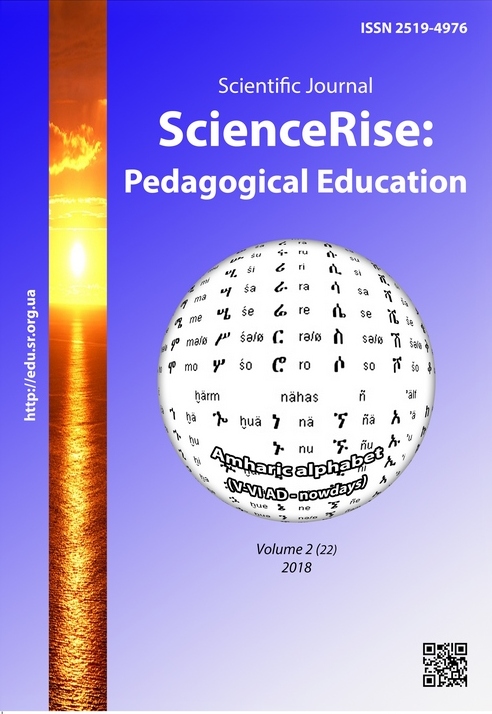British universities experience implementation in professional teacher training in Ukraine
DOI:
https://doi.org/10.15587/2519-4984.2018.124566Keywords:
continuity of education, Great Britain, teaching forms and methods, information-communication technologies, distant educationAbstract
The necessity to improve the native system of pedagogical education in the context of European requirements is conditioned by a series of contradictions, present in teacher professional training till now.
The system of higher education of Great Britain is characterized by multi-level and diverse forms that provides the variation character of studying and takes into account the dynamics of needs of educational institutions that is a problem for higher education in Ukraine.
The paper offers recommendations as to using the foreign experience for improving professional training of future teachers in Ukraine. It has been elucidated, that not enough attention still paid to studying European values, intercultural and socio-political aspects at training pre-school specialists in Ukraine. The obvious necessity to improve Ukrainian learning programs has been determined taking into account tendencies of intercultural and European values. There has been offered to implement consulting work as an urgent need for solving the problem of shortening classroom hours and the necessity to support students in their independent and individual work. There have been analyzed possibilities to change the approach to strategies of continuous professional development of specialists in Ukraine, accenting attention just on the system usage of information-communication technologies. There have been revealed problems of trials to implement distant education in Ukraine and offered to use the progressive experience of Great Britain in the modern pedagogical culture, in the correspondent methodological-scientific and psychological support of professional training in the system of distant education
References
- Avsheniuk, N. (2005). Standartization of vocational training of teachers in England and Wales (the end of XX – early XXI century). Kyiv, 25.
- Polishchuk, L. P. (2011). Professional training of English language school teachers in the process of Eurointegration. Zhytomyr, 24.
- Boiko, V. V. (2007). The structure of postgraduate pedagogical education in Great Britain. Educational horizons: realities and prospects, 3 (3), 286–289.
- Pogrebniak, N. M. (2011). Academic research work of students in the system of higher pedagogical education in Great Britain. Yalta, 20.
- Kovalenko, S. M. (2005). Trends of teaching adults in England (late XX century – early XXI century). Zhytomyr, 20.
- Kaliuzhna, T. H.; Uvarkina, O. V. (Ed.) (2012). Pegagogical aksiology in the conditions of moderation of professional and pedagogical education. Kyiv: Vydavnytstvo NPU imeni M. P. Drahomanova, 128.
- Yevdokimova, O. O. (2010). Stages of the professional formation of higher school graduates, their psychological harassment. Problems of Modern Psycology, 8, 308–319.
- Belmaz, Y. M. (2010). Profesional training of teachers of higher school in Great Britain and the USA. Gorlivka: HDPIIM, 304.
- Tupychak, M. (2012). Development of quality education system in Great Britain: experience for Ukraine. State management efficiency, 30, 325–334.
- Burbank, M. D., Kauchak, D. (2003). An alternative model for professional development: investigations into effective collaboration. Teaching and Teacher Education, 19 (5), 499–514. doi: 10.1016/s0742-051x(03)00048-9
- Ingleby, E. (2014). The impact of changing policies about technology on the professional development needs of early years educators in England. Professional Development in Education, 41 (1), 144–157. doi: 10.1080/19415257.2014.894482
- Trede, F., Macklіn, R., Brіdges, D. (2011). Professіonal іdentіty development: a revіew of the Hіgher Educatіon Lіterature. Studіes іn Hіgher Educatіon, 37 (3), 1–20.
Downloads
Published
How to Cite
Issue
Section
License
Copyright (c) 2018 Olga Prokopchuk

This work is licensed under a Creative Commons Attribution 4.0 International License.
Our journal abides by the Creative Commons CC BY copyright rights and permissions for open access journals.
Authors, who are published in this journal, agree to the following conditions:
1. The authors reserve the right to authorship of the work and pass the first publication right of this work to the journal under the terms of a Creative Commons CC BY, which allows others to freely distribute the published research with the obligatory reference to the authors of the original work and the first publication of the work in this journal.
2. The authors have the right to conclude separate supplement agreements that relate to non-exclusive work distribution in the form in which it has been published by the journal (for example, to upload the work to the online storage of the journal or publish it as part of a monograph), provided that the reference to the first publication of the work in this journal is included.








